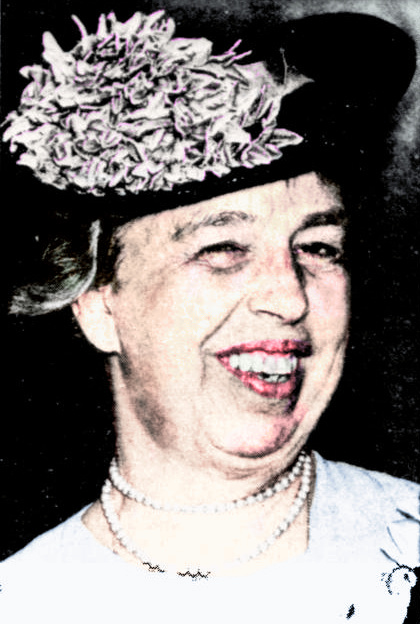
MY DAY
By Eleanor Roosevelt
July 1, 1940
Hyde Park, Sunday –
And so Mr. Wendell Willkie is nominated for President on the Republican ticket, and has as his running mate, Senator McNary. I have always liked the Senator. He is an attractive person. Therefore, from all accounts, we have two people with charm running for office in this presidential election. I do not know Mr. Willkie, but the headline in one of the metropolitan papers yesterday said “Willkie Aims At Unity, Defense and Recovery.” I’m discouraged. In Heaven’s name, will anyone aim at anything else?
Sometimes I wonder if we shall ever grow up in our politics and say definite things which mean something, or whether we shall always go on using generalities to which everyone can subscribe, and which mean very little. What is important, is how we expect to achieve the above objectives. That is the only thing that matters to the people of the country and, apparently, we are going to be very vague about these methods.
We can, however, judge parties and people by their records, and Mr. Willkie’s record is something all of us should study in the next few weeks.
It is sad to find Romania and Russia now fighting each other. I see, according to the paper, that King Carol is reported to have called upon Mr. Hitler to protect him, but it seems to me that we read not so long ago about a pact between Germany and Russia. That would seem to preclude any action which would be of real help to Romania. What a strange world that anyone, even in dire trouble, should seize on such a straw and hope for assistance!
We had a very pleasant party here on Friday night in honor of a combination of birthdays. A program of singing, music and dancing was provided for us by some young people who have been studying on an NYA program in New York City.
Three of them have jobs in summer hotels to provide entertainment this summer, one of them is playing with the NYA Symphony Orchestra in New York City. They came up here on their own time and they gave us such a pleasant evening, that I only hope they enjoyed themselves also.
Yesterday, our son Jimmy was here for a few hours and we sat in the sun and chatted before he had to leave to go to work. My niece and nephew, who were staying here, have gone back to Maine, and the house seems very quiet robbed of so much young life.
Mrs. George Huntington, who is staying with me, Miss Thompson and I motored down to Fishkill Saturday evening to dine with Mrs. Henry Morgenthau Jr.
The weather has continued to be as uncertain as possible, and we never know from minute to minute whether a thunderstorm is around the corner.
I have had very little exercise, for I find myself constantly catching up on work when I have a free day here. This week, however, I hope to take fewer trips to the city.